Turo is the Airbnb of car rentals.
However, just as Airbnb was not the first or last company to offer vacation rentals, Turo was not the first or last company to offer car sharing services.
Turo was founded in 2009 and competes in the market for peer to peer car rental marketplaces and traditional car sharing. Although there are many similar car sharing companies that compete in this space, every successful company is uniquely tailored towards a particular niche audience.
In this article, we will look at what are the top 7 Turo competitors and how each of these companies has carved out their own niche in the market for p2p and traditional car sharing.
Are you looking to build your own Turo competitor? Check out our article and video demo, how to build a car rental website like Turo.
1. HyreCar, focus on the gig economy
HyreCar is a Turo competitor which focuses on connecting drivers in need of long term car rentals with car owners who want to rent out their cars for longer periods of time.
What makes HyreCar truely unique is that they target drivers who want to earn income by renting out their vehicles for ride sharing services such as Uber, Lyft, and DoorDash.
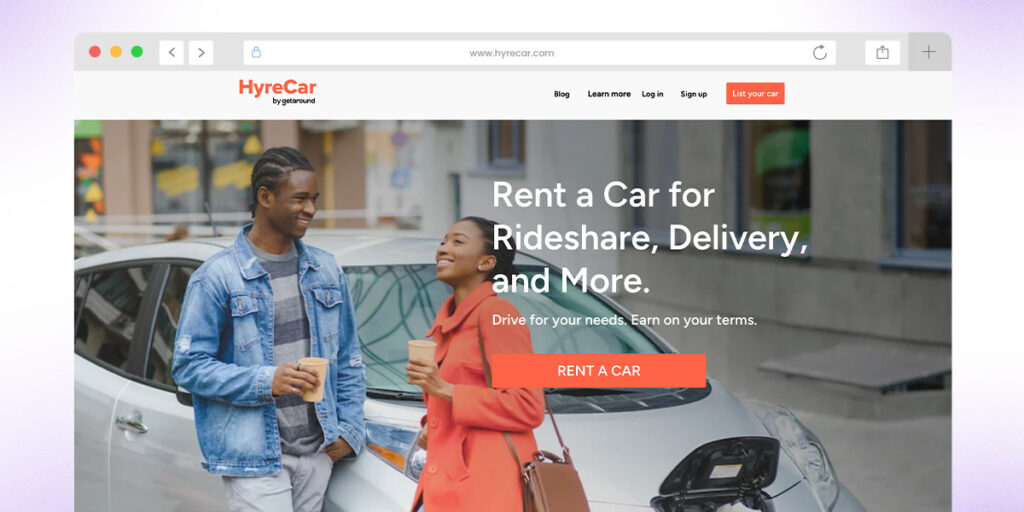
To target drivers who want to get into the gig economy, HyreCar don’t just focus on just renting out cars. Rather they have designed a product that is geared specifically towards helping drivers meet ride sharing company requirements. For example, HyreCar has a stringent set of checklist requirements that cars must pass to enable use on ridesharing platforms.
On the car owners side, HyreCar tends to attract car owners with multiple vehicles to rent. This is because longer term rentals enable owners with multiple vehicles to benefit from stable income without the hassle of constantly switching drivers.
The downside to HyreCar, when compared with Turo, is that the platform does less for car owners. For instance, HyreCar does not help car owners with driver tickets or citations for driving offences. This means that car owners will need to manually reach out to drivers each time this happens. Furthermore, the drivers that are attracted by the opportunity to enter the gig economy are normally inexperienced car owners. This means that car owners need to frequently reach out to their drivers to ensure that vehicles are being correctly maintained.
Potentially there is a gap in the market for a more version of HyreCar with more features for car owners? Learn how you can enter this market and build your own p2p car rental marketplace like Turo.
2. GetAround, a hands off experience
Next on our list of Turo competitors is GetAround.
Founded in 2009 in California, GetAround primarily targets individuals looking to rent cars for short periods of time to run errands and make other short trips. Typically renters are looking for a car for only a few hours or a few days at a time. If you know much about the history of Turo, you will know that this was a target market which Turo spent millions of dollars exploring and ultimately failed to crack.
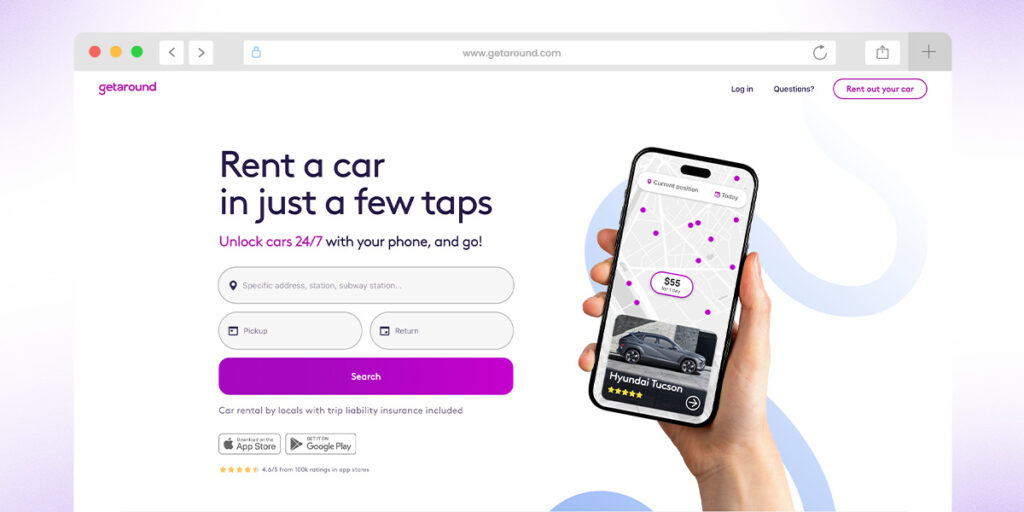
On the consumer side this market consists primarily of Urban dwellers who need access to mobility for one off errands, weekend getaways or other short trips. Meanwhile on the car owners side, GetAround targets predominantly working professionals and individuals seeking ways to rent out their cars while at work or during the evenings. In this model, the car owners need to be able to set schedules for when bookings can occur. After this, the users need to be almost entirely hands off.
To achieve this, GetAround uses a “keyless access” model that allows renters to unlock cars using the GetAround app and smartphone. This eliminates the need for physical keys and makes GetAround more convenient compared to Turo which uses a “key exchange model”. Furthermore, by installing physical devices into cars, GetAround is able to track and monitor additional information on their cars such as vehicle usage, location and condition. This provides an additional level of safety for car owners and provides valuable insights for both renters and owners. Lastly, GetAround customer support acts like a true middleman between car owners and renters. This means that the platform takes care of ticket violations, insurance, background checks and so on.
With this unique set of features, GetAround has enabled working professionals and individuals seeking flexible renting options to enter the car sharing game. These users can set specific time periods during which their vehicles are available for rent, allowing them to maximize their earnings without inconveniencing their own transportation needs. This flexibility aligns with the lifestyles of many working professionals who have regular 9 till 5 working hours during the day and downtime in the evenings or weekends when their cars can be rented out.
3. SnappCar, Europe’s GetAround
Another Turo competitor is Dutch based p2p car sharing company SnappCar.
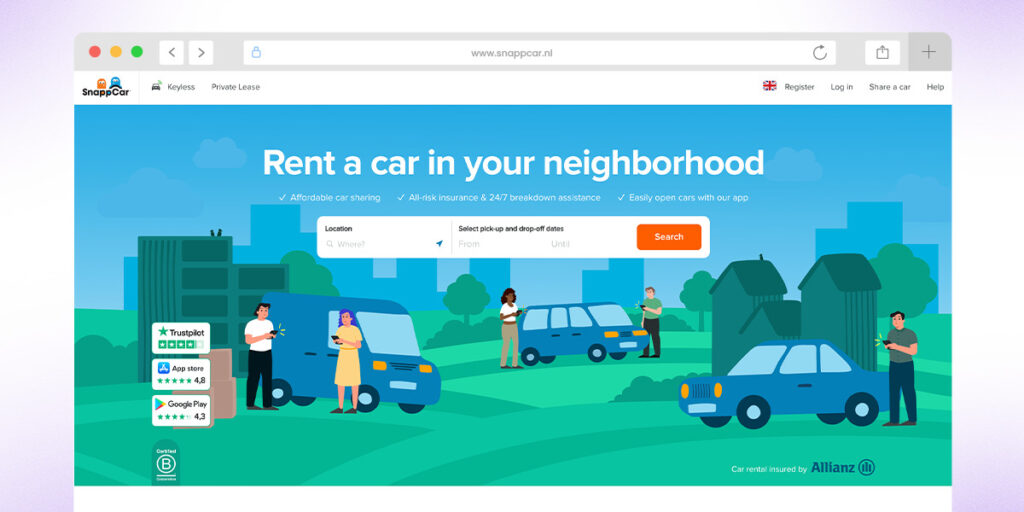
The company operates primarily in the Netherlands and Germany. Like GetAround, SnappCar targets urban dwellers looking to rent out cars for short periods of time. To achieve this, SnappCar also offers their customers a keyless technology which removes the need for a “key exchange” between car owner and renter. The platform includes other features for short term drivers including the option to pay by the hour.
Although SnappCar is very similar to GetAround, their target market has a different geographic focus. GetAround is focused on the US market, whereas SnappCar is focused on the European market. The geographic focus, along with creative marketing campaigns has allowed SnappCar to grow to more than 250,000 customers and offers more than 30,000 vehicles on its website.
4. ZipCar, car sharing
ZipCar was the original Turo competitor.
The company was founded in January 2000, nine years before Turo. ZipCar members can pick up their vehicle at a local parking space using a smartphone app and rent a ZipCar by the hour. However, ZipCar is a car sharing company NOT a p2p car rental marketplace. This means that the company directly owns and operates their own fleet of 12,000 cars.
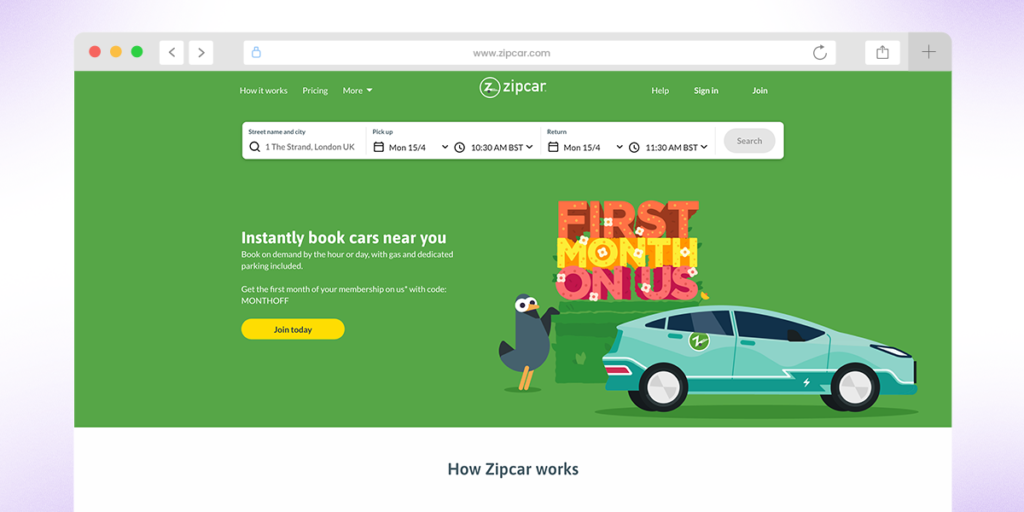
Compared to owning a fleet of cars, the peer to peer model for car rentals has clear advantages. For instance, in the p2p model the car “fleet” renews itself naturally, there are no parking or logistics issues, geographic expansion and scaling is faster and benefits from two sided marketplace network effects. That being said, p2p marketplaces survive off network effects and in the early days, Turo’s p2p models struggled to compete with ZipCar. In particular ZipCar focused hard on developing innovative technology that allowed for keyless car rentals and installed many cars across university campuses looking to attract a younger generation who were less interested in car ownership.
In January 2013, the car sharing giant Avis bought ZipCar for $491 million. Since then ZipCar has continued to grow, however it has never turned a profit since it was founded in 2020.
5. Uber Rental, a direct Turo competitor
Uber is a giant in the transportation sector. Whilst the platform is best known for their taxi hailing service, one of Uber’s subsidiaries is Uber Rentals which is a peer to peer car rental marketplace.
Uber Rentals was originally launched in Australia in 2021, after the company acquired the peer to peer car sharing start-up Car Next Door. Similar to Turo, Uber Rentals is targeted at individuals who require a car for an extended period, such as a day or longer. On the consumer side, the solution allows individuals to search, browse and then pay to reserve a car rental for a period of time and car owners are able to list their cars on Uber Rentals to make additional income.
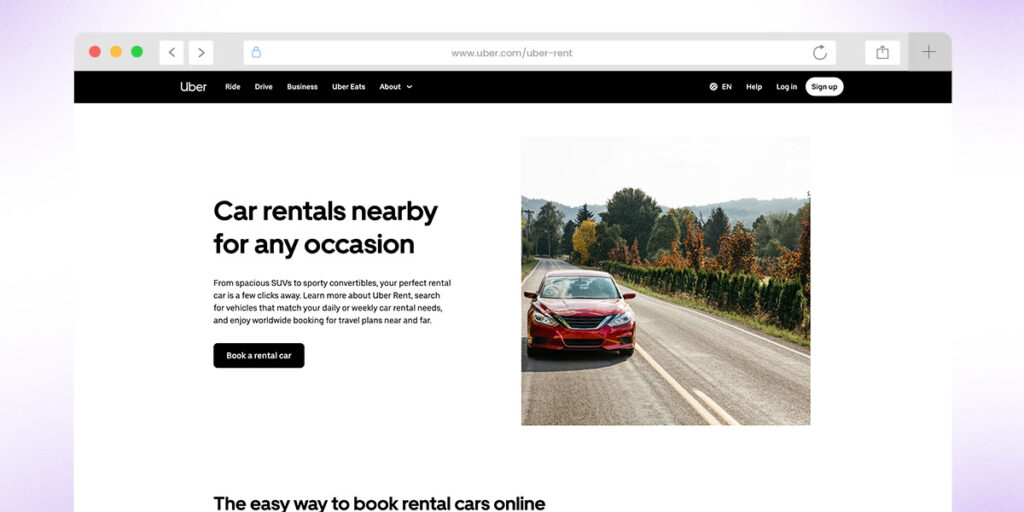
Uber Rentals differentiates itself from Turo by catering to a more budget-friendly audience. This is evident in Uber Rental’s terms and conditions which allows for older cars with more mileage to be eligible for their platform. For example, Uber Rentals permits cars up to 15 years old to be listed on their platform, whereas Turo’s limit is set at 12 years. Furthermore, Uber Rentals insures cars up to only $50,000 of total value compared to Turo which covers cars up to $200,000 really highlighting that Uber Rentals is looking to attract cars with lower value compared to Turo.
Uber Rentals also offers a different pricing model compared to Turo. Uber charges a time and distance rate with a fixed zero cost damage claim. This means that if a driver has an accident, the host does not need to pay anything. By contrast, Turo charges a flat day rate and offers hosts a revenue split based on the hosts choice of car insurance cover which is higher for if the host wants to pay nothing in the event of an accident. This means that with Turo drivers can potentially make more revenue per booking, but they will also need to absorb more potential liability.

Uber Rentals was originally incubated in Australia and is now available in the UK, Europe and the Americas. Uber was able to get immediate traction by tapping into their existing user base of more than 100 million people. The company has built several strategic partnerships including a deal with CarTrawler to provide customer service, cars and strategic insight into the market for car rentals.
6. BlaBlaCar, long term car pooling
BlaBlaCar is another Turo competitor that focuses on a target audience looking for long-distance carpooling. Car owners can sign up to BlaBlaCar and use their app to connect with co-travellers who can join them for a fee.
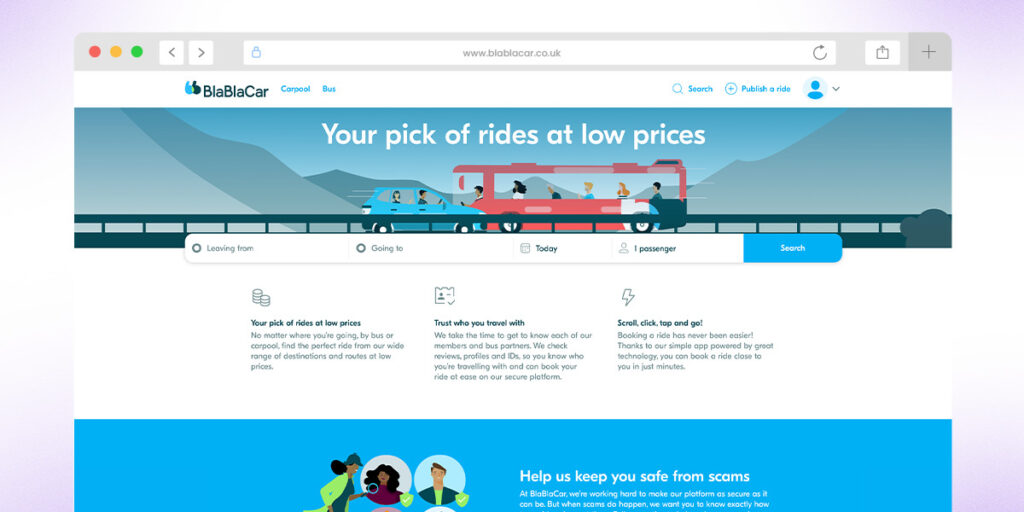
The service works by allowing car owners to sign up to the platform. Car owners provide information about themselves, their car, locations, availability of seats and so on.
From there the transaction flow is as follows:
- Travellers are able to request to join the driver on a trip for a price.
- Once accepted the trip begins at a pre-agreed pick up point and ends at a drop off point,
- Once the trip is complete both the driver and the traveller are able to rate each other.
- Finally, payment is transferred from the traveller to the driver.
BlaBlaCar saves almost 100% of the trip cost for the owner and offers a more comfortable ride for the co-travellers too. It also solves problems of boring travel, travellers costs, convenience and inadequacy in mass transport.
7. GIG Car Share in San Francisco and Seattle
Next on our list of Turo competitors is GIG Car Share.
GIG Car Share is a carsharing service in parts of San Fransisco Bay Area, Sacremento and Seattle created by “A3 Ventures” which is a division of the American Automobile Association (AAA).

GIG Car Share operates differently from peer to peer rental marketplaces like Turo. Instead of individuals renting out their own cars to others, GIG Car Share owns and operates its fleet of vehicles, which users can rent for short periods of time. The fleet is made up of Toyota Prius Hybrid vehicles and all electric Chevrolet Bolts.
Compared to Turo, GIG Car Share does not require a key exchange, rather the cars are locked and unlocked using Near Field Communications (NFC) card or their companion app. This means that GIG Car Share is more appropriate for shorter term car rentals. Furthermore, users are able to choose different rental plans that include being charged by the minute, hour, and day.
The main downside to GIG Car Share is that it is only available in parts of San Fransisco and Seattle.
Conclusion: Room for another Turo competitor?
In this article we looked at the top 7 Turo competitors.
Of course this list is by no means exhaustive and there are many more car rental companies like Turo or traditional car sharing companies that are all competing in this space.
The trick to building a new p2p car rental marketplace is to first define the niche audience that you’re going to target. This can be a geographic focus, as in the case of SnappCar or, a focus on problems that are unique to a customer segment as in the case of HyreCar.
There are many different niche marketplace ideas to be found and the market is continually shifting creating new opportunities all the time. The key to success is to pick a target audience that you feel passionate about, build a product that provides an economic benefit to this group and work out how to get your solution in front of that target audience in a cost effective way.
If you would like any help building a new peer to peer car rental marketplace, book a call with our marketplace specialists or check out some of our other resources on how to build peer to peer rental marketplaces.
Become a Marketplace Insider
Join our inner circle for exclusive insights, coveted trade secrets, and unparalleled strategies – your journey to marketplace dominance begins here.

